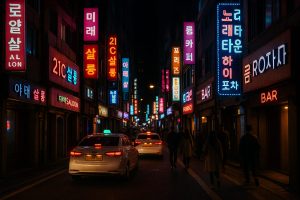 Jeju Island is renowned for its volcanic landscapes, stunning ocean views, citrus farms, and laid-back atmosphere. But after dark, a different economy hums to life. Beyond bars, pubs, and clubs, a more discreet but financially significant nightlife segment is the room salon — private‐room entertainment venues where guests pay for drinks, company, conversation, singing, and sometimes more intimate services. In Jeju, these salons are part of a broader ecosystem shaping jobs, local supply chains, tourism, and regulatory debates, with Jeju room salon reservation (제주룸싸롱 예약) often serving as the entry point for travelers and locals who want access to these exclusive venues.
Jeju Island is renowned for its volcanic landscapes, stunning ocean views, citrus farms, and laid-back atmosphere. But after dark, a different economy hums to life. Beyond bars, pubs, and clubs, a more discreet but financially significant nightlife segment is the room salon — private‐room entertainment venues where guests pay for drinks, company, conversation, singing, and sometimes more intimate services. In Jeju, these salons are part of a broader ecosystem shaping jobs, local supply chains, tourism, and regulatory debates, with Jeju room salon reservation (제주룸싸롱 예약) often serving as the entry point for travelers and locals who want access to these exclusive venues.
What Are Room Salons and How Do They Operate?
Room salons (룸살롱) are nightlife venues that emphasize privacy and exclusivity. Unlike open bars or karaoke lounges, they offer private rooms staffed by hostesses who entertain guests with conversation, drink service, karaoke, and social interaction. The business model combines liquor markups, time‐based fees, and service charges.
These salons often serve a clientele of middle- and upper-income individuals — including businesspeople, local elites, and out-of-town visitors — who seek a refined and discreet nightlife experience. In some cases, the line between social entertainment and more intimate services becomes blurred, which draws legal and social scrutiny.
In Jeju, demand for such venues is rising alongside general interest in nightlife diversification. Jeju room salons tend to be less crowded and more tailored than their counterparts in Seoul or Busan, with design and service scaled for an island clientele.
Economic Spillovers: Beyond the Salon Door
Room salons themselves are just one node in a chain of economic interactions. Their presence affects multiple sectors:
1. Hospitality, Accommodation, and Tourism
Visitors who come for nightlife often stay nearby, boosting occupancy for guesthouses, boutiques, and hotels in districts with concentrated nightlife. Some travel packages now emphasize evening entertainment as part of the Jeju experience.
2. Local Suppliers & Service Providers
Salons require a range of essentials, including food, snacks, beverages, flowers, interior décor, electronics, and cleaning services. Local distributors of liquor, fresh produce, and décor materials capture part of that demand.
Taxi services, ride-hailing, and late-night transportation also see increased usage. Peak hours around salon opening and closing amplify demand for mobility.
3. Employment & Wages
Room salons create direct jobs — including hostesses, waitstaff, managers, security personnel, and cleaners. Indirect employment emerges in supply chains, transport, and maintenance. For many workers, salons can offer relatively high earnings (especially via commission and tips). However, working conditions and labor rights remain contested in many cases.
4. Tax Revenue & Regulation
Licensing and permit fees, as well as taxes on liquor and entertainment, generate revenue for the local government. But regulating room salons is complex: authorities must balance promoting tourism and economic growth with enforcing laws on public health, zoning, and suppression of illicit activity.
5. Branding & Nightlife Image
A vibrant nightlife contributes to Jeju’s image as a full‐spectrum destination. Younger tourists often seek after-dark options, not just nature or relaxation. The visibility of upscale salons can help reframe Jeju as both tranquil and modern.
Challenges and Risks
The growth of room salons in Jeju comes with several challenges:
- Legal grey zones: Because many salons skirt the border between entertainment and sex work, they attract scrutiny for possible illegal or exploitative behavior.
- Regulation and zoning: Local authorities struggle to balance nightlife density with the preservation of residential and cultural areas. There is a risk of noise complaints, social backlash, or moral objections.
- Reputation risk: If salons attract scandal or are perceived as “vice spots,” that can tarnish Jeju’s brand as a clean, family‐friendly destination.
- Inequality and labor exploitation: Workers in salons may face unpredictable income, pressure to provide more than just conversation, or limited protections.
- Economic dependence: Overreliance on nighttime entertainment could distort local development priorities and divert investment from other sectors.
Finding Balance: Policy and Community Responses
To harness benefits while managing risks, a few policy and community tactics can help:
- Clear zoning rules
- Designate nightlife districts away from residential zones, with limits on density and operating hours.
- Transparent licensing and inspections
- Enforce health, safety, and wage standards to discourage entirely illicit operations.
- Partnerships with tourism agencies
- Incorporate salons into curated nightlife tours or cultural programming so that they complement, not compete with, Jeju’s nature and heritage.
- Support alternative nighttime culture
- Encourage music venues, late‐night markets, arts events, cafés, and performance spaces — giving residents more options and reducing dependence on salons.
- Community dialogue and social safety nets
- Involve residents, civic groups, and workers in shaping rules. Protect salon employees from abuse or coercion.
Conclusion
Jeju’s nightlife — including its room salons — is more than just after‐hours indulgence. It is a business sector with real economic weight. Room salons channel money into jobs, suppliers, accommodation, and local services. They help shape Jeju’s nighttime appeal, especially for younger or cosmopolitan tourists.
But the costs are real too: regulatory ambiguity, social backlash, labor risk, and the danger of skewed development. For Jeju to benefit in the long run, city planners and stakeholders need to guide nightlife growth with sensitivity — preserving community life and the island’s identity even as they let the neon glow.